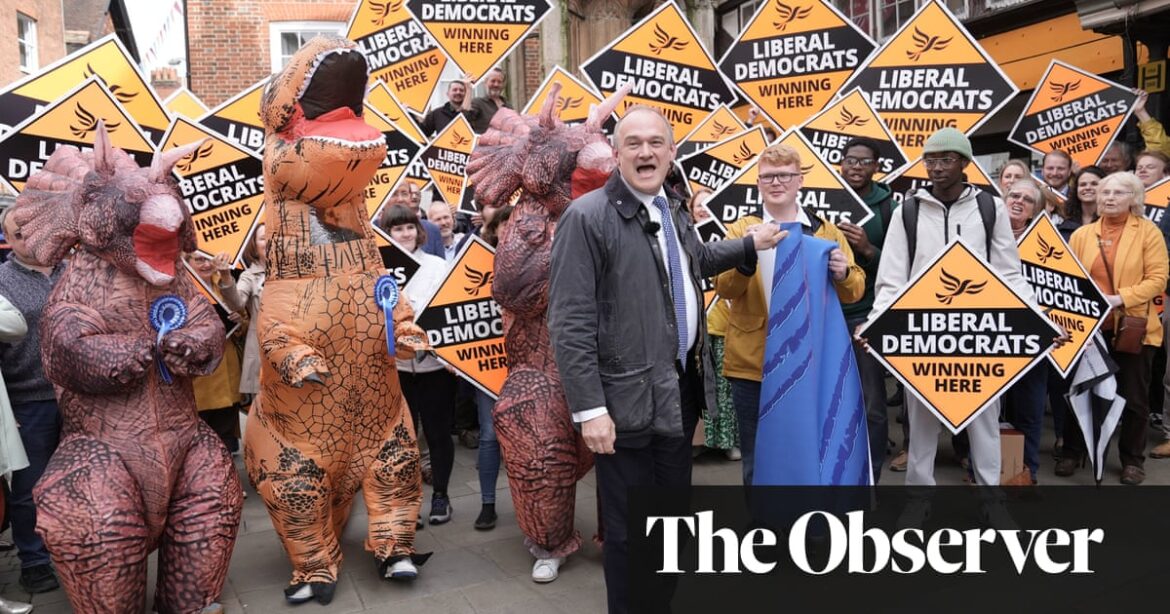
The Liberal Democrats are increasingly confident that they will claim more than one Tory “big beast” at the coming general election, pointing to local election results putting them ahead in a series of true blue constituencies.
Ed Davey’s party has been criticised for failing to improve its polling performance in recent months, while its 17% projected vote share from last week’s local elections was down slightly on last year.
However, party officials believe the results have proved that their strategy of ruthlessly targeting Tory wards in the seats they want to win is working. They believe the results put them on course to challenge the chancellor Jeremy Hunt and the housing and communities secretary Michael Gove in Surrey, and the justice secretary Alex Chalk in Cheltenham, as well as George Osborne’s highly rated former chief of staff Rupert Harrison, running in Bicester.
The local data suggests the Lib Dems won 50% of the vote in Chalk’s seat, compared with 25% for the Tories. The Lib Dems were 10% up across Surrey. In Esher and Walton, seat of the departing former cabinet minister Dominic Raab, they were ahead 43% to 29%. In Tunbridge Wells, another once-safe Tory seat held by the former cabinet minister Greg Clark, the Lib Dems won the local election vote 35% to 28%.
The party has used the local polls to examine whether their tactics were working. They believe they have performed very well where they are challenging the Tories and poorly in Labour-facing wards where they have not been campaigning or asked voters to vote tactically. There are also hopes of a recovery in Nick Clegg’s old seat of Sheffield Hallam, where they are also taking Tory votes.
Sir John Curtice, the election analyst, agreed that the Lib Dems had effectively “bet the farm” on taking on Tory areas. The surgical approach reverses their disastrous 2019 election campaign, when they fought on an anti-Brexit ticket and touted Jo Swinson, their leader at the time, as a potential prime minister. They now feel confident of claiming a big moment on the night of the general election by defeating a major Tory figure.
There is also a continued revival in the south-west, former stronghold of the party. Having won councils in Somerset and Devon in previous years, they secured overall control of Dorset for the first time.
The Lib Dems had hoped to win overall control of Wokingham council, instead falling one seat short. However, that was a contest in which their vote appeared to collapse in areas where Labour is strong and they had not campaigned. They are trying to unseat the former Tory cabinet minister John Redwood at the election. The local election vote share had the Lib Dems ahead 47% to 35%, party sources said.
“We are going to redouble our efforts to oust senior Conservative MPs who have taken their seats for granted,” a Lib Dem source said. “The home counties are turning their backs on a Conservative party they no longer recognise. The Liberal Democrats are flipping the electoral map on its head.”
after newsletter promotion
Elsewhere, the Greens have also been celebrating progress, winning more than 60 seats. The party performed particularly strongly in Bristol, where they could challenge the Labour frontbencher Thangam Debbonaire at the next election. The Greens finished second in her seat last time, though the boundaries have since been redrawn.
The party now has a record number of councillors across England as a result of last week’s elections. In Bristol, the Greens just missed out on taking overall control, winning 34 of the 70 seats available. Labour won 21 seats. Carla Denyer, the co-leader of the party in England and Wales, who is running against Debbonaire at the general election, said it had been “an amazing” set of results.
Source: theguardian.com



